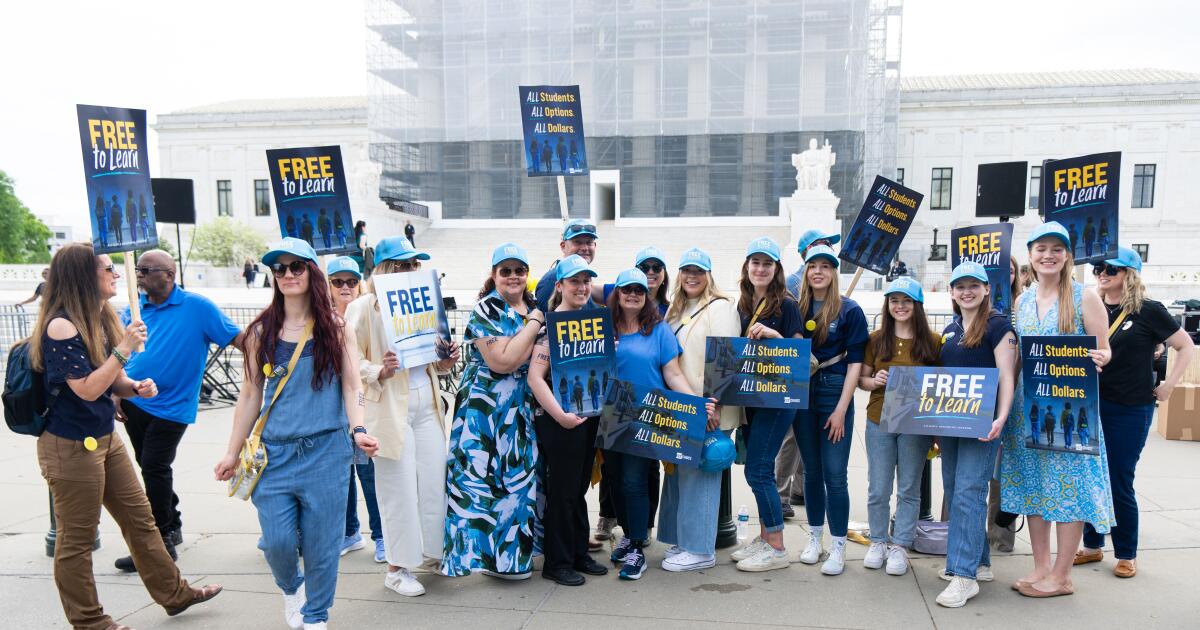WASHINGTON — The Supreme Court’s conservative majority appeared poised Wednesday to rule that church-run schools have a right to operate as public-funded charters.
If so, the decision could transform K-12 education and public schooling nationwide.
Since the early 1990s, charter schools have taken hold in 47 states as a popular public-funded option for parents and their children. They enroll 3.5 million children nationwide.
When establishing these new schools, lawmakers and education officials agreed they would be both public and “nonsectarian,” or not religious. They did so believing the Constitution’s ban on an “establishment of religion” and the principle of church-state separation prohibited using tax money to fund churches or teach religion.
But the court’s conservatives said Wednesday they believe it is unfair and unconstitutional to turn down church-run schools as tax-funded charters.
“They are saying don’t exclude us because of our religion,” said Justice Brett M. Kavanaugh.
Washington attorney Greg Garre said it would be “remarkable” and “astounding” for the court to overrule Congress and the laws of 47 states and to rule they must fund church-sponsored schools.
But that argument did not appear to sway the court’s conservative majority.
The charter schools case heard Wednesday highlighted the stark shift in religion law that has been engineered by Chief Justice John G. Roberts Jr. over the last decade.
In a series of opinions, he has staked out the view that denying public funding to religious groups violates the 1st Amendment and its protection for the “free exercise” of religion. His opinions said it is discriminatory and wrong to deny funding to churches or religious groups if others can obtain the same public benefits.
The court’s conservatives, all of whom were raised as Catholics, trace the history of opposition to “sectarian” schools to 19th century anti-Catholic “bigotry.”
Denying public funding based on religion “is odious to our Constitution and cannot stand,” Roberts wrote in 2017. Such discrimination violates the 1st Amendment’s protection for the “free exercise” of religion, he said.
That case involved a Lutheran church in Missouri that sought a state grant to improve the playground for its day care center. In later decisions, the court applied this principle to give parents a right to obtain state grants or vouchers to send their children to religious schools.
Now the court sounded ready to apply that principle nationwide, opening the door for churches to sponsor state-funded charter schools that could teach religion.
On Wednesday, the court confronted the high-stakes clash over the religious schools in a case from Oklahoma. It will determine not just whether states may permit church-run charter schools using public funds, but whether they must authorize them.
The court’s three liberals were skeptical of converting public charter schools into a program that includes privately run religious schools.
“The hallmark of public education is that taxpayers are paying for it,” said Justice Sonia Sotomayor. And the court’s precedents say that tax money should not be used to teach religion, she said.
But none of the conservative justices agreed.
Two years ago, the Catholic bishops of Tulsa and Oklahoma City formed a private, nonprofit corporation to establish the nation’s first religious charter school. They said St. Isidore of Seville Catholic Virtual School would operate “as a Catholic school” but would be open to all.
But Oklahoma Atty. Gen. Gentner Drummond said that public funding for the Catholic school would violate state and federal laws on charter schools as well as the state’s Constitution and the U.S. Constitution.
The Oklahoma Supreme Court agreed last year and blocked the authorization of the new charter school. “Oklahoma Constitution prohibits the state from using public money for the benefit or support of any religious institution,” the state justices said in a 6-2 decision.
The Alliance Defending Freedom, a Christian legal group, appealed to the Supreme Court, quoting the court’s opinions written by the chief justice.
They said the state court’s ruling against the new Catholic-run charter school “poses a grave threat to fundamental freedoms.” It “harms religious schools and religious parents who wish to send their children to schools that align with their values,” they wrote. “The Free Exercise clause firmly rebukes such anti-religious discrimination.”
Only eight justices will decide the case of Oklahoma Statewide Charter School Board vs. Drummond.
Justice Amy Coney Barrett is a longtime friend of Notre Dame law professor Nicole Garnett, who has been a leading advocate for religious charter schools. The two met when they were law clerks at the Supreme Court in 1998. Barrett was a clerk for Justice Antonin Scalia while Garnett worked for Justice Clarence Thomas. Afterward, they taught for decades at the Notre Dame law school.
In January, when the court said it would hear the charter school case from Oklahoma, the order also said Barrett “took no part” in the decision.
But the court’s five other conservative justices heard Wednesday’s argument. In addition to Roberts, they include Justices Clarence Thomas, Samuel A. Alito, Neil M. Gorsuch and Kavanaugh. In their questions, all five sounded as though they would rule in favor of the Catholic charter school.
The court will hand down a decision by late June.
